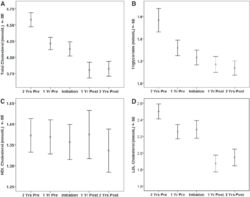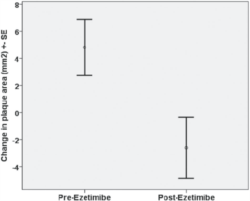Ezetimibe and Regression of Carotid Atherosclerosis:
The effect of adding ezetimibe on total plaque burden was analyzed. Ezetimibe appears to regress carotid plaque burden in clinical practice
Ezetimibe and Regression of Carotid Atherosclerosis:Importance of Measuring Plaque Burden.Literature - Bogiatzi C, Spence JD.; Stroke. 2012 Jan 5 - Stroke. 2012 Jan 5. [Epub ahead of print]
Bogiatzi C, Spence JD.
Stroke. 2012 Jan 5. [Epub ahead of print]
Background and purpose:
There has been recent controversy over failure of ezetimibe to reduce carotid intima-media thickness. Much of this is based on failure to understand important differences among ultrasound phenotypes of atherosclerosis.Methods:
We analyzed the effect of adding ezetimibe to the regimen of patients being followed in vascular prevention clinics where measurement of carotid plaque burden (total plaque area) is used to guide therapy.Results:
There were complete data in 231 patients with total plaque area for 2 years before and 2 years after initiation of ezetimibe. In the 2 years before and after initiation of ezetimibe, total cholesterol decreased significantly before (P<0.0001) and after initiation of ezetimibe (P<0.0001); low-density lipoprotein cholesterol declined significantly before (P<0.0001) and after (P=0.003) initiation of ezetimibe. Triglycerides declined significantly before ezetimibe (P<0.0001) but did not change after addition of ezetimibe (P=0.48). High-density lipoprotein cholesterol did not change significantly before (P=0.87) but declined significantly after ezetimibe (P=0.03). Despite the decline in low-density lipoprotein cholesterol before addition of ezetimibe, there was a significant mean increase in within-individual total plaque area in the 2 years before addition of ezetimibe by 6.89±39.57 mm(2) (SD); after addition of ezetimibe, despite the decline in high-density lipoprotein, plaque area decreased by -3.05±SD 38.18 mm(2) SD (P<0.01).
Conclusions:
Ezetimibe appears to regress carotid plaque burden. To assess effects of antiatherosclerotic therapies, it is important to measure plaque burden. These findings should be tested in a clinical trial.
Background
The effects of ezetimibe have been frequently misinterpreted, as intima-media thickness (IMT) is not the same as plaque, which is atherosclerosis [1]. Since plaque regression can be measured by measuring carotid total plaque area, the effect of ezetimibe on plaque regression was analyzed in this study 2 years before and 2 years after ezetimibe was added to the treatment of patients who were already on a lipid-lowering regimen.
Main results
There were 231 patients with complete data on total plaque area at each time point for analysis.In the 2 years before and after initiation of ezetimibe, total cholesterol and LDL-C decreased significantly before (P<0.0001) and after initiation of ezetimibe (P<0.0001/0.003, respectively); triglycerides showed a significant decrease before ezetimibe (P<0.0001), but did not change after (P=0.48). HDL-C did not change significantly before (P=0.87) but showed a significant decline after ezetimibe (P=0.03). (Fig.1) Although LDL-C decreased before ezetimibe was added, within-indiviual total plaque area increased significantly in the 2 years before adding ezetimibe by 6.89±39.57 mm2 (SD), whereas after addition of ezetimibe, despite the decrease in HDL-C, plaque area decreased by -3.05±38.18 mm2 (SD) (Fig. 2). In patients not receiving ezetimibe, total plaque area continued to progress despite a decline in LDL.
 Figure 1. Figure 1.Serum cholesterol (A), triglycerides (B), high-density lipoprotein (HDL; C), and low-density lipoprotein (LDL; D) by years before and after initiation of ezetimibe (mmol/L, mean±SE). |
Reference
1. Finn AV, Kolodgie FD, Virmani R. Correlation between carotid intimal/medial thickness and atherosclerosis. A point of view from pathology. Arterioscler Thromb Vasc Biol. 2010;30:177–181.

